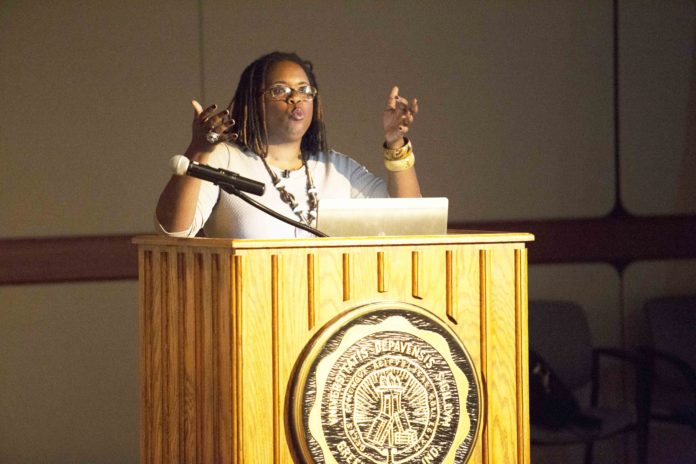
Melanye Price, associate professor of Africana studies at Rutgers University, hosted a discussion about race and former President Barack Obama on Wednesday as part of DePauw’s Black History Month speaker series.
“I am finding myself personally being challenged in this moment to be silent,” Price said. “It is difficult. It is soul-killing in a way that it was not last October.”
Price specializes in public opinion, black politics, social movements and political psychology.
Price spoke in Watson Forum about her 2016 book, “The Race Whisperer: Barack Obama and the Political Uses of Race.” She referenced critical moments in the Obama presidency that demonstrated how The President dealt with race during his term: his address of the Trayvon Martin case, the arrest of Henry Lewis Gates, and the trial of Michael Brown. Price called Obama “a person who is playing around with the fluidity of race.”
She said the ways Obama employs race make him what she calls a “race whisperer,” a person “who is able to seamlessly and agilely employ racial language and tropes by using personal experiences or common historical themes to engage and mobilize diverse racial constituencies.”
She connected her book and Obama’s political race relations to the Black Lives Matter movement, linking Trayvon Martin, Michael Brown, Henry Lewis Gates, and Barack Obama together as black men struggling to find their places in a white society.
“What they were really engaged in, what Trayvon Martin and Michael Brown lost their lives for, was a negotiation over the right to belong” Price said.
In her conclusion, Price spoke about Obama’s transition from “race whispering” to convincing the American public that he belonged in the White House. According to Price, even Obama was not free from the struggle to belong.
“In our homes, in our streets, in our nation’s most important residence, the question of belonging haunts the lives of black men and boys and black women and girls,” Price said. “All African Americans are constantly negotiating where they belong in their personal and collected histories.”
Price stressed the need for communication with regards to race issues.
“These questions are so old and so entrenched in the social scheme of black people’s lives that they are used to dealing with it like an unwelcome cough or itch,” Price said. “But for the dominant group, for whites, these questions often become tiresome, and they are often able to push them to the periphery. But the power of these questions, I argue, is their ability to deliver a sucker-punch to comfort and complacency.”
For white students on campus wondering how they can help to make the DePauw community a safer place for students of color, Price offered some advice: become an ally.
“Whites have to do a lot of work around what it means to be an ally. And a lot of your ally work is actually within your own community, and making your community a less dangerous place for marginalized groups,” she said.
After the event, first-year Kaleb Anderson reflected on his experiences as a student of color on campus thus far.
“I think that the biggest thing is not looking to students of color to talk about their experiences as if we all are the generalization of our own identities,” Anderson said. “I think that even though students of color are sometimes willing to share their stories, at the same time, we have to learn how to take care of ourselves in ways that white students don’t have to consciously think about.”
First-year Brittany Davis appreciated that the conversation brought together students from different communities, even though the issues were not new to students of color.
“I think that most people hadn’t heard it before, but if you’re a student of color, it’s something that you already recognize,” Davis said.
Both Anderson and Davis want more diverse speakers like Price to come to campus outside of Black History Month. They believe these speakers could facilitate conversations about race among different communities on campus. Anderson also thinks a more diverse staff could contribute to marginalized groups feeling more welcomed.
“I definitely think we need more diverse speakers, a more diverse staff, a more diverse student population so that marginalized communities have a bigger voice on campus,” he said. “And I think that once that happens, things will slowly continue to change like they’re changing now.”
Price shared advice with students of color on campus negotiating their right to belong:
“You have to figure out how much you want to live your life on the periphery of things that you’re interested in and how much you want to live your life on the center of things that you’re interested in,” she said. “Are you going to be the person who changes with every community that you’re in, or are you going to be the person that wants to figure out who you are and then figure out how other people are going to adjust?”
